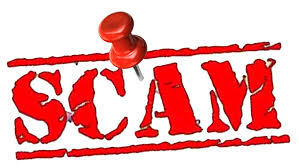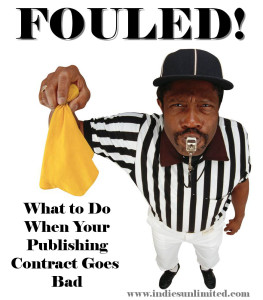 Most of my posts at Indies Unlimited are tutorials, how-tos on multiple aspects of publishing I hope to help both beginning and more experienced authors learn the tricky ropes of indie publishing.
Most of my posts at Indies Unlimited are tutorials, how-tos on multiple aspects of publishing I hope to help both beginning and more experienced authors learn the tricky ropes of indie publishing.
This one is going to be different, because I’m seeing an increase in scam companies preying on uninformed and inexperienced authors. I’m an author, but I’m also a small (very small) publisher. My publishing company is a member of the Independent Book Publishers Association (IBPA). After a year or two of membership, I was invited to apply for a position on their Membership Benefits Jury. This means every quarter I’m one of several who review and vet entities who want to be listed as an IBPA benefit. For example, members of IBPA get a discount with Bowker, the U.S. site for buying ISBNs. IBPA offers many such incentives, and companies are eager to partner up.
I’ve made it through two rounds of vetting now, and with the last one I emailed my contact and said, “How blunt can I be? Because I have some serious concerns.”
We’ve all he ard or read about publishers that turn out to be scammers. Indies Unlimited did a whole series about them. But what I’m seeing is an increase in services for authors, anything from publicists to author coaches to marketers to printers. Not a day goes by that I don’t see at least one sponsored ad from one of the above in my Facebook newsfeed. Not a quarter goes by that I don’t see at least one proposal from one in my duty as a member of the Benefits Jury.
ard or read about publishers that turn out to be scammers. Indies Unlimited did a whole series about them. But what I’m seeing is an increase in services for authors, anything from publicists to author coaches to marketers to printers. Not a day goes by that I don’t see at least one sponsored ad from one of the above in my Facebook newsfeed. Not a quarter goes by that I don’t see at least one proposal from one in my duty as a member of the Benefits Jury.
There are certainly legitimate services out there under all of those umbrellas. There are also scams: people looking for a way to take your money. As with all aspects of publishing, be sure to do your research before depleting your bank account. Google is your friend. Research everything and everyone.
During my last round of vetting, I did some investigation into a company that wanted to present a workshop on book marketing. They offered a special rate to IBPA members to attend the day-long online workshop. They had included a very professional-looking itinerary in their packet, along with an impressive list of reviews for their three books on marketing.
It sounded great, but these sorts of places always do. So how can you tell if it’s a legitimate service?
Being a suspicious sort, I took a look at those highly reviewed books. The best ranked book they had on Amazon was sitting at over 4,000,000. It had been out for over a year, and – this was interesting – none of the reviews in their portfolio appeared on Amazon. The book had no reviews at all on Amazon. It also had no “also boughts” (that row of books underneath your book that tells you your book is selling right along with others in its genre). Those book-marketing books weren’t selling.
No one outside of Amazon really knows how Amazon’s algorithm works, but it’s a combination of your sales in relation to other sales. The lower the rank, the better. If a book is sitting at 4,000,000, as theirs was, that means 3,999,999 other books are selling better than theirs. Their worst-selling book was at nearly 9,000,000. I hadn’t even realized Amazon had that many books.
If someone wants to charge you to attend their book-marketing workshop, make sure their books are selling. If they can’t sell their own, how are they going to help you sell yours?
It looks as if this entity doesn’t make money from oodles of book sales as a result of their superior marketing skills; they make money from you, when you pay to attend a workshop to learn, presumably, the same marketing strategies that clearly aren’t working for their own books.
Book marketers should be able to sell their own books. If they can’t, how can they teach you to sell yours?
Author Coaches should have written successfully selling books. If they haven’t done it themselves, how can they coach you?
Printers should offer a better deal than the ones self-published authors can already access from CreateSpace or IngramSpark.
Publicists should be able to demonstrate their ability to get you and your book into places you can’t access on your own.
No matter how pretty the presentation is, dig deeper to make sure you’re getting your money’s worth.

I know what you mean. I’ve fallen for a few of these scams. Live and learn, I guess.
Unfortunately, as soon as we figure one scam out, another one seems to pop up. Thanks for stopping by, Richard.
Excellent post, Melinda. I am always cautioning my self-pub students about this, but this is very useful as a yardstick. I will let my students know!
Thanks, Melissa. It’s been disheartening to see so many of these circling around.
Great advice! Thank you for sharing!
Take Care, Keith
Thanks for stopping by, Keith.
“Publicists should be able to demonstrate their ability to get you and your book into places you can’t access on your own.”
Or at least to get you into places you could get yourself if you’re willing to pay them to do the legwork. If nothing else they should be aware of potential venues to get you publicity that you’d have to work to uncover. I see a lot of … ummm, we’ll call it stuff, from publicists and I’ve often wondered how many indies could actually justify the cost based on the benefit they receive.
I’ve wondered the same thing, Al. I get that a lot of people don’t want to spend the time it takes to get “out there,” but they need to make sure a publicist earns their hard-earned money.
Great tips on smoking out the scammers, Melinda.
Thanks, Lynne!
These guys are so slick it’s almost impossible for a newbie to see through them. Thanks for looking into this.
Thanks, Yvonne. They really are. The package I looked through looked wonderful. Not truthful, but it looked wonderful….
I published my first book with Trafford, a subsidiary of Author House. They turned out to be a huge scam operation, milking unwary authors for thousands of dollars on worthless promotional schemes. I wrote about their techniques in The Author House Scam, available on Amazon. There are quite a number of scam publishers under Author House including Trafford, X-Libris and i-Universe.
Some of the problems with them, aside from charging tremendous fees for worthless promotions, are that they do no editing and push authors into publishing books that aren’t ready, there is no accountability for royalties, and a number of authors have complained that they did not receive royalties on books they knew had been sold, and the author has no control over the pricing of the books, so the books are price above what the market will bear.
Yes, those names are all familiar. We’ve got several articles about them: https://indiesunlimited.com/2015/03/05/how-to-avoid-publishing-predators/
I’m sorry you had to go through that. Not too long ago a family friend had a similar experience. When she told me she’d paid for a $7,000 package, I could have cried for her.
I recently heard of an author way down here in NZ who paid $15,000. But what for? So heartbreaking for them.
Thanks for this, Melinda.
There is a whole cottage industry – several Indies Unlimited people are part of it – of small operators who provide various services, such as editing and formatting, for very reasonable prices.
The important part of using one of us is that we don’t promise to do it all for you. As Indie authors ourselves, we know that sooner or later you have to take charge of the production and sales of your Indie books. So we tend to take more of a mentorship role, and as you might have noticed, give away a lot of advice for free.
Sure, you pay people to do the things you can’t or don’t want to do. But the more you do yourself, the more you learn, and the more you’re in control of your own career.
Great points!
Thanks for this, Melinda. We can never be too cautious when it comes to scammers, and – unfortunately – there will always be people who fall for this nonsense, just like there will always be people who manufacture it. The “Preditors and Editors” web site is another resource for aspiring writers. But writers should follow the same practice as other artistic hopefuls, such as actors, actresses and models. If an agent asks for money up front, just get up and leave. Agents of any type in the performing arts are supposed to make money only when the talent does. That’s why they take a certain percentage off the top of the final proceeds. Of course, the adage “If it looks too good to be true, it probably is,” holds true as well.
“Agents of any type in the performing arts are supposed to make money only when the talent does.” Well said!
Thank you for the nice article on scammers.
Thanks, JB!
Melinda–great article. We cannot have too much data on services and the people offering it. I visit forums and indies are rowdy about lack of sales. The more difficult to sell our books, the easier it is for an indie to fall prey to sorcerers promising fairy dust. Shoddy operators do try to piggyback on honest endeavors. Savvy indie’s know this and do their homework. The less savvy too often don’t catch the red flags. But there is this and I don’t know any way around it: Some indies want the glory so badly, or have such an inner belief they’re doing it right, they will fork over the $$$. That’s the point in which I say: Author Choice and move out of the way. Within the last ten days I was offered co-promoting with two authors. I checked their books. One is 9 pages and the other 24 pages. I looked Inside. Fish bait books. Holy smokes. We really have to stay alert. Love that you posted this.
Thanks, Jackie, and thanks for stopping by. Yes, we definitely have to stay alert.
Great post Melinda. Like Jackie says we all have to watch out for those sharks out there.
Thanks, Ellie. Yes, we do – and they can be really hard to spot.